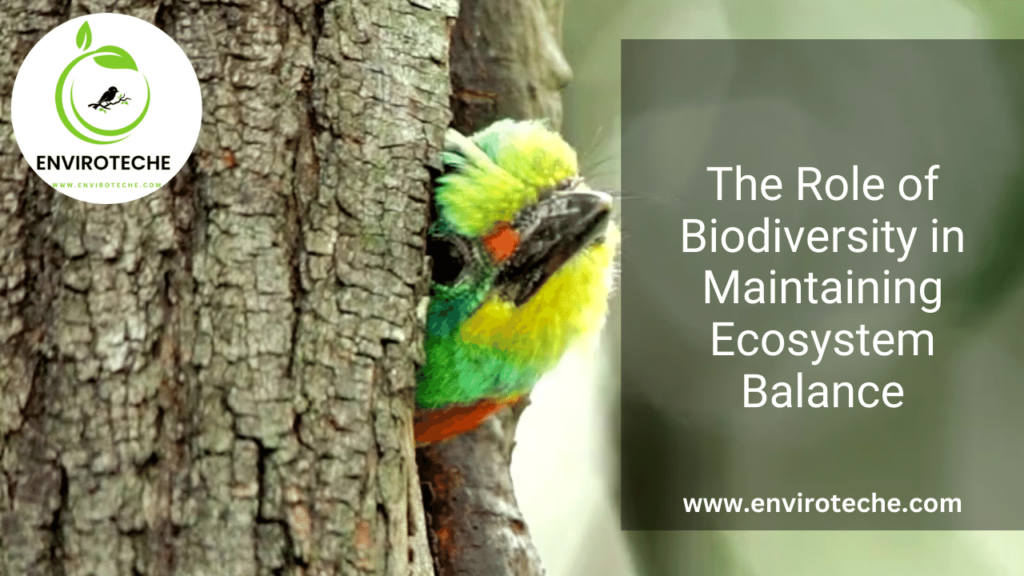
Muhammad Qasim1, Nimra Ather2
Department of Environmental Sciences, Government College University Faisalabad1
Department of Zoology, University of Agriculture Faisalabad2
Introduction:
The diversity of life on Earth, or biodiversity, is essential to preserving the health and equilibrium of the ecosystems on our planet. Every species, from the smallest bacteria to the greatest mammals, contributes to the complex web of life. We will explore the relevance of biodiversity in this blog, looking at how it promotes ecological balance and offers crucial services to both people and the earth as a whole.
- Ecosystem Balance: Biodiversity is crucial for preserving the equilibrium of the ecosystem. Every species in an ecosystem has a certain function to perform, which is often referred to as its place in the environment. Predation, competition, and symbiosis are a few interactions that take place in these niches. These interactions result in the formation of intricate and robust ecosystems when biodiversity is high. Here are some reasons why biodiversity is important for the stability of ecosystems:
- Food Chain Stability: Different species live at various trophic levels of the food chain in a diversified habitat. A single species’ presence or absence can have an impact on the number or shortage of other species throughout the entire food chain.
- Resistance to Disturbances: Ecosystems with a greater diversity of life tend to be more resilient to disturbances like invading species and natural catastrophes. A wide variety of species makes sure that, even if one species is harmed, others may make up for it, sustaining the ecosystem’s general stability and functionality.
- Ecosystem Services: Several ecosystem services that BD offers are essential to both human welfare and the health of our planet. Four different categories can be used to group these services:
- Provisioning Services: We acquire vital resources from BD for both survival and economic activity. Food, medications, wood, textiles, and fuel are a few examples. Many medicinal medications come from animals and plants that live in various environments.
- Regulating Services: Numerous mechanisms that are essential for maintaining life on Earth are regulated by biodiversity. Climate regulation, water filtration, pollination, pest management, disease control, and carbon sequestration are all included. Our agricultural systems, climatic stability, and general well-being would all suffer greatly in the absence of these services.
- Cultural Services: The cultural value of biodiversity for human societies is enormous. Art, literature, and mystical practices are all inspired by it. Many indigenous cultures have strong ties to the ecosystems in their immediate surroundings and depend on biodiversity for their sense of self, traditions, and means of subsistence.
- Supporting Services: All other ecosystem functions are supported by biodiversity because it provides the essential ecological framework. Fundamental processes that maintain life on Earth include soil formation, nitrogen cycling, the process of photosynthesis, and primary production. These processes are all influenced by biodiversity.
- Nutrient Cycling and Soil Fertility:
Soil fertility and nutrient cycling are directly related to biodiversity. To recycle nutrients and keep soils fertile, various creatures, especially microorganisms, plants, and animals, interact in intricate ways. For instance, some plants have symbiotic connections with bacteria that fix nitrogen from the atmosphere into a form that plants can use. These plants then add nitrogen to the soil, which benefits surrounding ecosystem species.
- Pollination and Food Production:
Pollination is one of the most renowned and important services offered by biodiversity. A significant part of the reproduction of flowering plants, including many of the food crops we depend on, is played by bees, butterflies, birds, and other pollinators. Fruit, vegetable, and nut output would be drastically reduced in the absence of pollinators, which would have an effect on both human livelihoods and world food security.
- Natural Pest Control:
Additionally, biodiversity aids with organic pest management. Natural predators control insect populations in a diversified habitat, negating the need for chemical pesticides. For example, birds and bats consume insects, which helps to regulate their populations and stop epidemics. We can reduce our reliance on dangerous chemicals and advance sustainable agriculture by preserving healthy biodiversity.
- Climate Regulation:
The regulation of the Earth’s climate is greatly aided by wetlands, forests, and other ecosystems. For instance, trees capture carbon dioxide from the air and store it as biomass, which helps to slow down global warming. Ecosystems that are rich in biodiversity are better equipped to sequester carbon, which makes them crucial in the fight against global warming. Furthermore, healthy coastal ecosystems like mangroves and seagrass beds serve as natural barriers to storm surges and erosion along the coast, defending vulnerable settlements.
- Medicine and Pharmaceuticals:
For thousands of years, the natural world has been a rich supply of therapeutic substances. A wide variety of plants, animals, and microbes found in biodiversity have special genetic resources that can be used to create novel medications. Antibiotics, cancer treatments, and painkillers are just a few of the life-saving medications that have their roots in natural substances. We ensure the potential for future discoveries that can address health issues by protecting biodiversity.
Conservation and Sustainable Practices:
It is necessary to preserve and promote biodiversity because it plays a critical role in supporting ecosystems and enhancing human societies. Here are some crucial sustainable and conservation methods:
- Protected Areas: Creating protected areas like national parks and wildlife reserves aids in the preservation of habitats and the protection of endangered species. These regions support the preservation of biodiversity and offer locations for scientific study and instruction.
- Sustainable Land Use: Encouragement of environmentally friendly land use methods like agroforestry and organic farming lowers habitat damage, pollution, and the use of dangerous chemicals. These methods support food production while preserving biodiversity.
- Awareness and Education: It is imperative to spread knowledge about the value of biodiversity and how it affects human health. Education is essential for encouraging responsible behavior and equipping people with the knowledge they need to make choices that will protect biodiversity.
Conclusion:
The proper functioning of ecosystems and the provision of necessary services to humans and the planet depend on biodiversity, which goes beyond aesthetic appeal or conservation ethics. Biodiversity is essential to our health and survival, supporting everything from food production to natural pest management, climate regulation, and medicinal research. Since the loss of biodiversity poses serious hazards to both current and future generations, it is our common responsibility to maintain and restore it.
Check Other Schlorships:
